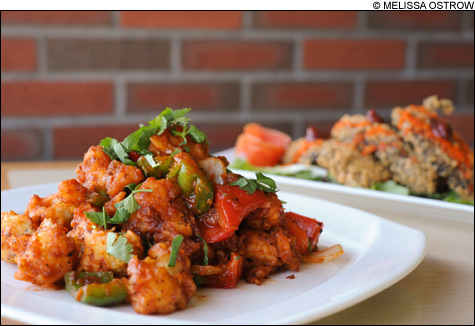
MANCHURIAN CANDIDATE The emerging signature appetizer at Red Lentil is gobi Manchurian, batter-fried cauliflower with Indian spices. |
| Red Lentil Vegetarian and Vegan Restaurant | 600 Mount Auburn Street, Watertown | 617.972.9188 | Open Monday–Thursday, 11 am–9:30 pm; Friday and Saturday, 11 am–10 pm; and Sunday, 9 am–3 pm And 5–9:30 pm | AE, Di, MC, Vi | No liquor | No valet parking | Access up two steps from sidewalk level |
By now everyone knows Red Lentil is dog-plays-the-piano good. It’s the best all-vegetarian and lots-vegan restaurant Boston has ever had. The question before us is: is it actually good-good? Would a carnivore in the mood for vegetables go there? I think so.The chefs use fresh vegetables, often organic. They fry things. They do exotic. On the other hand, they don’t always do exotic quite right. If you are going to have Mexican pizza ($12), for instance, you can put avocado, black beans, corn, and actual cheese (sorry, vegans) on it, but you can’t really add mango. I know the non-vegetarians do that ham-and-pineapple pizza and call it Hawaiian. But without ham in the cupboard, you need either a saltier cheese or olives.
The emerging signature appetizer, gobi Manchurian ($7.50), is actually the kind of Indian take on Chinese food that the Delhi-born chef grew up on. Batter-fried cauliflower with Indian spices is stir-fried with red and green bell peppers and onions in a little tomato sauce. Both fry jobs are impeccable, and the dish is irresistible. Although it is listed as an appetizer, it’s the size of many Chinese and Indian entrées meant for sharing.
Close to that level is the pan-seared portobello strips ($7), four chewy, meaty mushrooms (easily cut into eight to 12 bites), dipped in ultra-crisp Japanese panko bread crumbs and topped with neat squiggles of an orange-bell-pepper purée and an applesauce-like mango chutney. Beet and potato latkes ($6.50) are a nice idea that doesn’t quite work because latkes are crisp, while beets, which seem to make up most of the mixture, are watery. Maybe the chef should dry the beets by salting them? Use more potato? Add batter for a more pakora-like effect? Change the name to beet-potato galettes? Who knows, but given the number of kosher-keeping Jewish customers here, the L-word is a provocation. That said, they have lots of flavor, plus more of that applesauce-like chutney and a delicious mint-chutney.
Salads are a smart option, given the restaurant’s commitment to fine produce. Mizuna salad ($9) is loaded with the pretty scalloped leaves of the Japanese mustard-cabbage, a light dressing, and very effective sections of blood orange, pumpkin seeds, and craisins. A roasted beet and walnut salad ($9) needs only a little longer roasting time on the slices of red and golden beet. The nuts and goat cheese (sorry again, vegans) are worthwhile additions, but this salad will really hit its stride when arugula is in season.
Soups ($4/cup; $5.50/bowl) are all vegan, and both we tried have solved the large problem of getting enough umami (the Japanese word for savoriness) without the addition of meat or fish stocks. They do need more precision of spicing to meet the restaurant’s goals of worldbeat vegetarianism. The soup of our day, Thai noodle, for example, used coconut milk like the Thai coconut chicken soup, plus extra vegetables, but lacked the powerful lemongrass and galangal flavors of the Thai classic. Even the standard ginger miso soup, filled with appropriate seaweed and dried tofu, didn’t sing with ginger or miso.